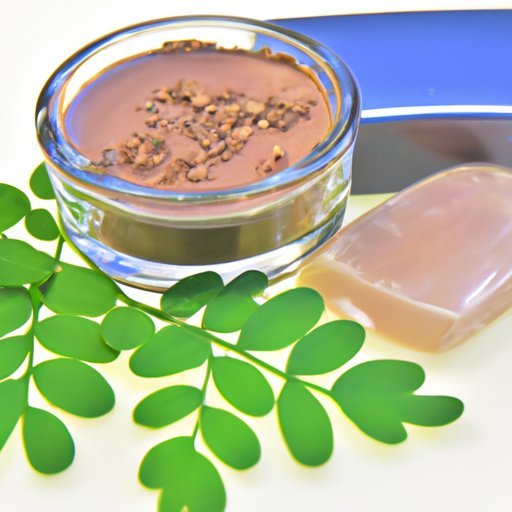
I. Introduction
Seborrheic dermatitis is a common skin condition that affects millions of people worldwide. It can be challenging to manage but is not life-threatening. It develops when the sebaceous glands in the skin are overactive, leading to excessive oil production, inflammation, and irritation. This article will explore various ways to cure seborrheic dermatitis, including natural remedies, skincare, lifestyle changes, and medical treatments.
II. Understanding the Causes of Seborrheic Dermatitis
Seborrheic dermatitis can affect anyone at any age, but certain factors may increase the risk of developing this condition.
Genetics
Studies show that genetics play a significant role in the development of seborrheic dermatitis. People with a family history of this skin condition are more likely to develop it themselves.
Lifestyle habits
Several lifestyle habits can increase the risk of developing seborrheic dermatitis, including poor hygiene, excessive alcohol consumption, and smoking.
Medical conditions
Medical conditions such as Parkinson’s disease, HIV, and epilepsy can increase the risk of developing seborrheic dermatitis.
Environmental factors
Environmental factors such as weather changes, exposure to harsh chemicals, and stress can also trigger or worsen seborrheic dermatitis.
III. Natural Remedies for Seborrheic Dermatitis
Several natural remedies may help to relieve the symptoms of seborrheic dermatitis. These include:
Tea tree oil
Tea tree oil has antifungal and anti-inflammatory properties that may help to reduce the severity of seborrheic dermatitis. Apply diluted tea tree oil to the affected area and leave it on for a few minutes before rinsing it off.
Apple cider vinegar
Apple cider vinegar has antifungal and antibacterial properties that may help to reduce inflammation and itching. Mix equal parts of apple cider vinegar and water and apply it to the affected skin using a cotton ball. Let it dry, then rinse it off with water.
Aloe vera
Aloe vera has anti-inflammatory and soothing properties that can help to reduce redness and itching. Apply aloe vera gel to the affected skin and leave it on for 10-15 minutes before rinsing it off.
Probiotics
Probiotics can help to balance the bacteria in the gut, which may improve the symptoms of seborrheic dermatitis. Consider adding probiotic-rich foods such as yogurt, kimchi, or sauerkraut to your diet.
Sunflower oil
Sunflower oil has anti-inflammatory properties and may help to improve the skin barrier function, reducing dryness and irritation. Apply sunflower oil to the affected area and leave it on for a few minutes before rinsing it off.
IV. Best Skincare Products for Seborrheic Dermatitis
Choosing the right skincare products can make a significant difference in managing seborrheic dermatitis. Here are some recommendations:
Gentle cleansers
Opt for gentle, fragrance-free cleansers that do not irritate the skin. Look for products that contain soothing ingredients such as colloidal oatmeal, aloe vera, or chamomile.
Moisturizers
Use fragrance-free moisturizers that provide deep hydration to the skin without clogging the pores. Choose products that contain ceramides, niacinamide, or hyaluronic acid.
Prescription creams
If natural remedies and OTC products are not effective, your doctor may prescribe topical creams such as corticosteroids or calcineurin inhibitors to reduce inflammation and itching.
OTC creams
Over-the-counter creams that contain antifungal or anti-inflammatory ingredients such as ketoconazole, zinc pyrithione, or salicylic acid can also help to manage seborrheic dermatitis.
Sunscreen
Use a broad-spectrum sunscreen that does not contain fragrances or other potential irritants to protect the skin from UV rays. Look for products that contain zinc oxide or titanium dioxide.
V. Medicated Shampoo for Seborrheic Dermatitis
For many people, seborrheic dermatitis affects the scalp, causing dandruff-like symptoms. Medicated shampoos can help to manage this condition.
Overview of the Role of Medicated Shampoos
Medicated shampoos usually contain antifungal or anti-inflammatory ingredients that help to reduce the symptoms of seborrheic dermatitis. It’s essential to follow the instructions carefully and use the shampoo as directed.
Options Available and Their Effectiveness
There are several medicated shampoos available over the counter, such as Nizoral, Head & Shoulders, or Selsun Blue. In severe cases, your doctor may prescribe a stronger medicated shampoo or a combination of shampoos to manage the symptoms of seborrheic dermatitis.
Other Hair Care Tips for Seborrheic Dermatitis
Wash your hair regularly with a gentle shampoo and avoid using hot water or harsh chemicals that can irritate the scalp. Do not scratch or pick at the affected area, and avoid wearing tight hats or other headwear that can make the symptoms worse.

VI. Lifestyle Changes to Improve Seborrheic Dermatitis
Several lifestyle changes can help to improve the symptoms of seborrheic dermatitis. These include:
Getting Enough Sleep
Getting enough restorative sleep can help to reduce stress and inflammation, improving the overall health of the skin.
Managing Stress
Stress can trigger or worsen seborrheic dermatitis. Consider practicing relaxation techniques such as meditation or yoga, getting regular exercise, and finding healthy ways to manage stress.
Eating a Healthy Diet
Eating a well-balanced diet rich in vitamins and nutrients can help to boost the immune system and reduce inflammation. Avoid processed foods, sugary snacks, and saturated fats.
Avoiding Alcohol and Smoking
Both alcohol and smoking can cause inflammation and dehydration, making the symptoms of seborrheic dermatitis worse. Avoid these habits or seek professional help to quit.
Exercise
Regular exercise can boost circulation, reduce stress, and improve overall skin health. Consider low-impact exercises such as walking, swimming, or cycling.
VII. Medical Treatments for Seborrheic Dermatitis
If natural remedies, lifestyle changes, and OTC products are not effective, your doctor may recommend medical treatments. These include:
Overview of Prescription Treatments
Prescription treatments for seborrheic dermatitis usually include topical creams or oral medications that reduce inflammation, itching, and the overproduction of skin cells.
Topical Creams
Corticosteroids, calcineurin inhibitors, and antifungal creams can help to reduce the symptoms of seborrheic dermatitis when applied topically to the affected area.
Oral Medications
In severe cases, your doctor may prescribe oral medications such as retinoids or immunosuppressants that work internally to reduce inflammation and other symptoms of seborrheic dermatitis.
Risks and Benefits of Medical Treatments
Prescription treatments for seborrheic dermatitis can have potential side effects such as thinning of the skin, irritation, or allergic reactions. However, for many people, the benefits outweigh the risks, leading to improved skin health and reduced symptoms.
VIII. How to Manage Seborrheic Dermatitis Flare-Ups
Even with proper treatment, seborrheic dermatitis can flare up from time to time. Here are some tips to manage flare-ups:
Avoiding Triggers
Keep a journal to identify triggers such as stress, weather changes, or certain foods and avoid them where possible.
Minimizing Stress
Use relaxation techniques to manage stress when it arises, such as deep breathing or mindfulness exercises.
Using Natural Remedies
Consider using natural remedies such as aloe vera, tea tree oil, or apple cider vinegar to reduce the symptoms of a flare-up.
Seeing a Doctor When Necessary
If your symptoms do not improve with self-care or OTC products, make an appointment with your doctor to discuss other treatment options.
IX. Conclusion
Seborrheic dermatitis can be a frustrating condition to manage, but with the right treatment plan, it is possible to reduce the symptoms and improve skin health. Try natural remedies such as tea tree oil, apple cider vinegar, or aloe vera, choose gentle skincare products, make lifestyle changes such as getting enough sleep, exercising, and avoiding triggers when possible. For severe cases, your doctor may recommend medical treatments. Remember to be patient and take care of your skin, and don’t hesitate to seek professional help if necessary.





